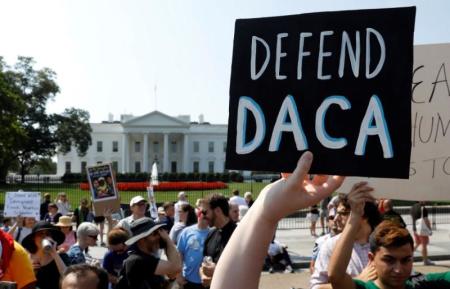Praying, Pleading, for Consensus That Protects Dreamers

"Hope deferred makes the heart sick," the Bible tells us.
Regrettably, Dreamers throughout the country have lived that experience repeatedly in recent months and in new ways in recent days. The creation of the Deferred Action for Childhood Arrivals (DACA) program in 2012 was life-changing for hundreds of thousands of young people—but the announcement of its termination last September meant, barring legislative intervention, that they would lose their jobs and potentially even face deportation. Reports of a bipartisan "deal" gave us new hope—only for it to be dashed within hours. We're fervently praying that our elected officials will come together quickly to find consensus.
We write, respectively, as the leader of a network of more than forty thousand Hispanic evangelical congregations and as a staff member at one of those local churches—World Impact Center - Impacto de Fe in Commerce City, Colorado—whose employment is possible only because of the DACA program.
My (Abigail's) story is similar in many ways to those of tens of thousands of others within churches that are represented by the National Hispanic Christian Leadership Conference (NHCLC). I arrived in the U.S. on a tourist visa with my family on July 4, 1999. I thought the fireworks were there to welcome us to our new home. But when my family overstayed their visas—a concept I could not understand as a small child—and became undocumented, our life was very challenging. When my friends were applying for driver's licenses, I discovered I could not. Though I was a strong student, I was ineligible for federal financial aid or for in-state tuition rates, so I could only afford to attend college part-time.
My family and I found strength in our local church, though, and I genuinely believe it came as an answer to the prayers of many in that church and in churches throughout the country that the DACA program came about, allowing me to work lawfully, pay my taxes, pay my way through college, and give back, serving on the staff of a local elementary school and now at my church. I am so incredibly grateful for this country and the many blessings it has offered to me, and I desperately want to be able to continue to contribute. But, without congressional action, I will lose my work authorization next year—a message I conveyed to legislators as I joined a delegation of other Christian Dreamers in Washington, D.C. recently.
I (Samuel) meet young people like Abigail on a regular basis in my role with the NHCLC and within the church that I pastor in Sacramento, California. They want nothing more than to continue to live, work, and contribute, using the gifts that God has given each of them to their fullest potential. Their churches are standing with them in pleading with both Republicans and Democrats in Congress to come together to pass legislation.
But it's not just Latino Christians who care about this: a poll last fall found that more than 70 percent of evangelical Christians of all ethnicities support legislation to allow Dreamers to stay in the U.S. and keep their jobs. More than 60 percent of those who voted for President Trump want these individuals to be able to become U.S. citizens, according to a Fox News poll. By roughly an eight-to-one margin, a recent Quinnipiac University poll found, Americans prefer allowing Dreamers to stay to their deportation.
"Hope deferred makes the heart sick," the author of Proverbs continues, "but a longing fulfilled is a tree of life." Members of Congress from both parties can come together quickly to resolve their differences, and President Trump can have the opportunity to do something none of his predecessors have been able to do: offer real, permanent hope to young people who are Americans in every way except on paper. In doing so, we promise that they will bear fruit, giving back many times over to this great country.
Rev. Samuel Rodriguez is the president of the National Hispanic Christian Leadership Conference. Abigail Molina serves on the staff of World Impact Center - Impacto de Fe, a non-denominational evangelical church that is a part of the National Hispanic Christian Leadership Conference.





















